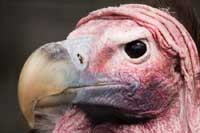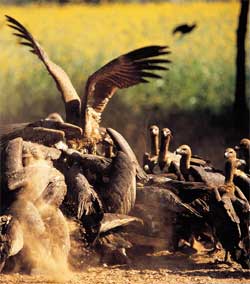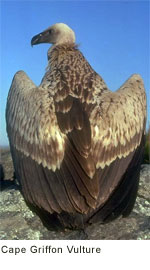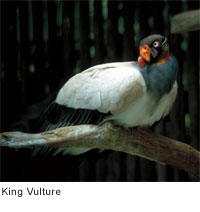|

 Bald head: A particular characteristic of many vultures is a bald head, devoid of feathers. Bald head: A particular characteristic of many vultures is a bald head, devoid of feathers.
A feathered head would become splattered with blood and other fluids during feeding, and thus be difficult to keep clean. A bald head allows for quick cleaning in a nearby river.

Prey: Vultures seldom attack a healthy living animal, but may kill the wounded or sick. Vast numbers have been seen upon battlefields.
 Table Manners: They gorge themselves when prey is abundant, and then sit, sleepy or half torpid, Table Manners: They gorge themselves when prey is abundant, and then sit, sleepy or half torpid,
to digest their food. They do not carry food to their young in their claws,
but disgorge it from the crop. These birds are of great value as scavengers, especially in hot regions.
Endangered: The vulture population in India has declined by up to
95% recently and two or three of the species of vulture in South Asia
are nearing extinction.
The cause was the practice of giving working animals the non-steroidal
anti-inflammatory drug diclofenac, which has a pain killing action.
Diclofenac administration keeps animals that are ill or in pain working on the land for longer. Diclofenac accumulates in the animals' bodies; when the ill animals die, their carcasses will still contain the diclofenac. Farmers leave the dead animals out in the open, relying on vultures to tidy up. Diclofenac present in carcasses it also eaten by the vultures, but unfortunately vultures are very sensitive to diclofenac and suffer kidney failure and death as a result of diclofenac poisoning.
Hygiene problems: The decline has led to general hygiene problems in India as carcasses of dead animals now tend to rot, or be eaten by rats or wild dogs, rather than be tidied up by vultures. In addition, there are particular problems for certain human communities, such as Parsis, that have sky burials where the human dead are put on the top of Towers of Silence where vultures eat and clean the bodies and leave only dry bones.
Safe drug: Meloxicam – another NSAID similar to diclofenac – has been found to be harmless to vultures and should prove to be an acceptable alternative. The Government of India has banned diclofenac, but it continues to be sold over a year later.

 Brave Old and New Worlds: Vultures fall into two groups. The Old World vultures found in Africa, Asia and Europe belong to the family Accipitridae, which also includes eagles, kites, buzzards and hawks. They find carcasses exclusively by sight. Brave Old and New Worlds: Vultures fall into two groups. The Old World vultures found in Africa, Asia and Europe belong to the family Accipitridae, which also includes eagles, kites, buzzards and hawks. They find carcasses exclusively by sight.
New World vultures and condors are not at all closely related to the superficially similar Accipitridae, but belong in the family Cathartidae, which is quite close to the storks. Several species have a good sense of smell, unusual for raptors.
The similarities between the two groups are due to convergent evolution rather than a close relationship.
Vultures and cultures: In Southern Africa, the name for a Nubian Vulture is synonymous with the term applied to lovers, because these vultures are always seen in pairs, mother and child remaining closely bonded together. Pairing, bonding, protecting, and loving are essential attributes associated with a vulture. The vulture was thought to be close to the gods who resided in the sky because of its immense size and its ability to soar high up in the sky.
 The Egyptians considered the vulture to The Egyptians considered the vulture to
be an excellent mother, and its wide
wing-span was seen as all-encompassing and providing a protective cover to its infants.
In contrast to many other birds of prey, vultures have often been considered
repulsive in Western culture, due to their association with death. Sensationalistic journalists looking for news about bloody crimes are sometimes called "vultures". Financial investors who look for indebted companies or countries to buy securities at low prices are known as vulture funds.
All text is available under the terms
of the GNU Free Documentation License
|